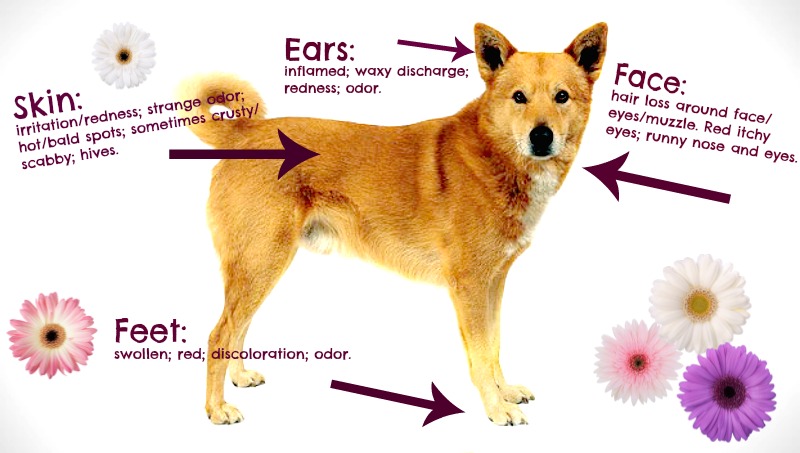Free Ideas On Deciding On Dog Herbalist
Wiki Article
Probiotics Helps With Skin Allergies.
Probiotics can play a significant part in managing and alleviating allergies to the skin in both cats and dogs. Probiotics are beneficial bacteria that help keep an optimal gut microbiome which is in turn, helps support the overall immune system and the health of your skin. Probiotics can help treat allergic skin conditions in pets:
Immune System Regulation
Immune Balance:
Function: Probiotics help regulate the immune system by promoting the development of beneficial bacteria and inhibiting harmful bacteria in the intestine.
Benefits: A healthy immune system that's balanced can decrease hypersensitivity, which contributes to allergies. This may help reduce the severity and frequency of allergic reactions in animals.
Inflammation Reduction
Anti-inflammatory Effects:
Function Probiotics: Certain strains are able to produce anti-inflammatory substances and also regulate inflammatory responses in the body.
Benefits - By reducing systemic swelling, probiotics are able to ease itching, inflammation and other symptoms associated with allergic reactions.
Gut-Skin Axis
Improved Gut Health:
Function: The gut's skin axis refers the relationship between gut health and skin health. Probiotics enhance gut barrier function and are essential to ensure digestive health.
Benefits Healthy guts help prevent the release of toxins and allergens into the bloodstream, which can cause skin reactions. This could reduce allergic skin symptoms.
Strengthening Skin Barrier
Enhanced Skin Barrier Function:
Function: They can influence the production of other liquids, such as ceramides that are essential for maintaining an epidermis that is healthy.
Benefits: Skin barrier strengthening assists in reducing the likelihood of allergies, skin infections and other skin conditions.
Allergy Symptom Management
Treatment of symptoms:
Function: By regulating the release of histamines as well as other chemical components involved in allergic reaction Probiotics can aid in managing symptoms.
Benefits: It reduces the itching, irritation, and discomfort that can be caused by allergies to the skin in pets.
Enhance the diversity of microbes
A broader range of microbial species is increased:
Function: Probiotics enhance the diversity of the gut microbiome, which is essential for a balanced immune response.
Benefits : A diverse Microbiome can improve overall health as well as skin health. This is accomplished by stopping the proliferation of harmful bacteria that can cause allergies.
Specific Probiotic strains
Lactobacillus and Bifidobacterium: These are popular probiotic strains that have been found to be effective in managing allergic skin conditions in pets.
Lactobacillus Rhanosus GG is well known for improving gut health and for reducing symptoms of allergies.
Bifidobacterium animals: Helps decrease inflammation and improves the immune system.
Use and considerations
Dosage and administration Dosage and administration to administer depends on the weight, size and health requirements of your pet. It is essential to follow the recommendations of your veterinarian or the instructions on the label of the product.
Formulations Probiotics can be found in powders, chews and capsules. To ensure safety and effectiveness it is essential to choose the best quality, pet-specific product.
Monitoring and side effects: Although probiotics are safe in general, it's crucial to keep your pet in check for reactions that could cause digestive upset. You can reduce the risk of adverse reactions by starting with a smaller dose and then gradually increasing the dosage.
Conclusion
Probiotics can be extremely beneficial in reducing skin allergies in dogs and cats by regulating the immune system, reducing inflammation, improving the barrier to skin, and improving overall gut health. Regular usage can lead to a reduction of allergy symptoms. They also help to promote healthier skin for pets and an increase in the quality of their life. Have a look at the top natural dog probiotics url for blog info including pet dental supplements, premium quality pet supplements, natural dog supplements, natural pet food, pet alfalfa supplements, pet supplements for pets with fear of ear cleaning, pet prebiotics australia, pet calming supplements and more.

Coconut Oil Can Help Dogs And Cats Who Suffer From Skin Allergies.
Coconut oil is a natural cure that can help manage skin allergies in dogs as well as cats due to its moisturizing, anti-inflammatory, antimicrobial, and healing properties. Coconut oil is a safe solution which can assist pets with allergies.
Moisturizing Properties
Skin Hydration
Coconut oil is easy to penetrate and is a great moisturizing agent.
Benefits: It helps to hydrate dry, flaky skin, providing relief from itching and encouraging the health of the skin barrier. This is especially useful for pets suffering from dermatitis allergic that can result in dry, itchy skin.
Anti-inflammatory effects
Reduce inflammation
Coconut oil is a natural anti-inflammatory agent due to lauric acids.
Benefits: Applying coconut oil to affected areas can reduce redness, swelling, and discomfort associated with skin allergies. This is an excellent option for pets with allergic reactions.
Antimicrobial activity
Beware of Infections
Function: Coconut oil contains antimicrobial properties like lauric and caprylic acids, which help to combat bacteria and viruses, fungi and other microorganisms.
The benefits: Coconut oil can prevent or treat skin infections secondary to those that often occur due to scratching or irritation caused by allergies. This helps maintain the health of your skin and prevents any future complications.
Relaxation and healing
Promoting Healing
Coconut oil helps to support the natural healing process of the skin.
Benefits : It is an all-natural remedy that can help repair minor cuts and abrasions. This helps speed up the healing process of damaged skin caused by allergies.
Barrier Protection
Enhancing Skin Barrier:
Coconut oil is a natural moisturizing agent which helps strengthen the barrier to skin.
Benefits: Having a stronger skin barrier decreases allergic reactions as well as the risk of infection.
Dietary Supplements
Internal Benefits
Function: Coconut oil can also be given orally as a dietary supplement.
Benefits: It helps to maintain the health of your skin from the inside. Its anti-inflammatory and antimicrobial properties reduce inflammation throughout the body and boost the immune system of pets and reduce the frequency of skin allergies.
Considerations for Use
Application to the skin: Apply a small quantity of coconut oil onto the affected skin areas. Massage gently until it is absorption. It is possible to do this once or twice a day depending on the severity of the skin condition is.
Coconut oil can also be added directly to pet food. The typical dosage is 1 teaspoon for every ten pounds. It is recommended to begin slowly and then increase the dosage in order to avoid gastrointestinal upset.
Coconut Oil Quality: Make sure that you are using organic coconut oil, which is free of additives, preservatives and other chemical compounds.
Watching for reactions. While coconut oil is generally considered to be safe for pets, be sure to watch for any reactions.
The article's conclusion is:
Coconut oil is a natural remedy that can be used to treat skin allergies in both cats and dogs. Its moisturizing, anti-inflammatory, antibiotic, and healing qualities help to soothe and protect the face reduce swelling and itching and improve overall skin health. Coconut oil can be applied on its own or as a supplementation to help reduce the symptoms of allergies in pets who suffer from skin allergies. Take a look at the recommended dogs supplements examples for site info including pet urinary tract supplements, cat supplements, pet supplements for pets with fear of change, pet supplements for show dogs and cats, pet immune system supplements, pet supplements for rescue pets, pet wellbeing australia, pet supplements for pets with fear of tv and radio and more.

What Are The Ways That Cat And Dog Yeast Infections Treated With Apple Cider Vinegar?
ACV can be utilized as a remedy for yeast infection in dogs and cats. ACV is a good option, but it is important to utilize ACV under the supervision of a veterinarian and with caution because of the acidic nature of ACV and possible negative side consequences. Here's the way ACV is thought to help with yeast infections:
Antifungal Properties
Acidic Environment:
ACV functions as an acidic substance, having a normal pH range of between 2.5 and 3. This environment can be inhospitable for yeast to grow.
Benefits: Applying ACV in its dilute form on your pet's skin or ears, as well as adding it to bath water, can help reduce yeast.
Skin pH Regulator
Balancing Skin pH:
The function: ACV is believed to help balance the skin's pH levels, which may help support the health of the skin barrier and stop yeast growth.
Benefits: Keeping a healthy pH balance on the skin can help keep yeast infections at bay and improve overall skin health.
Anti-inflammatory effects
Reduce Inflammation
ACV is mildly anti-inflammatory.
Benefits of reducing inflammation: This may reduce symptoms that are of yeast infections, including redness, itching and discomfort.
Support for Digestive Health
Internal Use
ACV improves digestion when taken in smaller quantities.
Benefits Helping to support overall immune function as well as microbial balance and gut health may reduce the growth of yeast.
Use and considerations
Topical Use: Mix it by adding water (typically 1 to 2 parts ACV for 1 part water) and apply as a spray to the affected area of the ears or skin. Avoid applying ACV directly on open wounds on the skin or to sensitive areas.
Consult your veterinarian before using ACV internally. ACV is a good choice for small children in small quantities and should be extremely dilute (e.g. 1 teaspoon or a tablespoon for each cup water).
Examine for signs of irritation or any allergic reaction when applying ACV on the skin. If you experience any adverse reactions, discontinue using ACV.
A consultation with a veterinarian prior to applying ACV as a treatment for yeast infections, it is recommended to consult with your vet. They can assist you with the proper dilution techniques as well as application methods and potential risks with your pet.
The final sentence of the article is:
Although apple cider may be beneficial in treating yeast infections in dogs and cats it should still be used with caution under the supervision of a vet. ACV's acidic qualities can impede yeast growth within the ear as well as on the skin. It is also possible that they provide some mild anti-inflammatory benefits. However, dilution is essential and also a careful application to avoid irritation. The guidance of veterinary medicine ensures that ACV is used safely and effectively as part of a comprehensive treatment plan to treat yeast-related infections in animals. Take a look at the most popular kidney failure in cats blog for website info including holistic pet supplements, pet astragalus supplements, pet supplements for pets with joint stiffness, pet supplements for pets with fear of loss, pet supplements for pets with fear of eye drops, natural pet vitamins, pet yucca supplements, pet collagen supplements and more.
